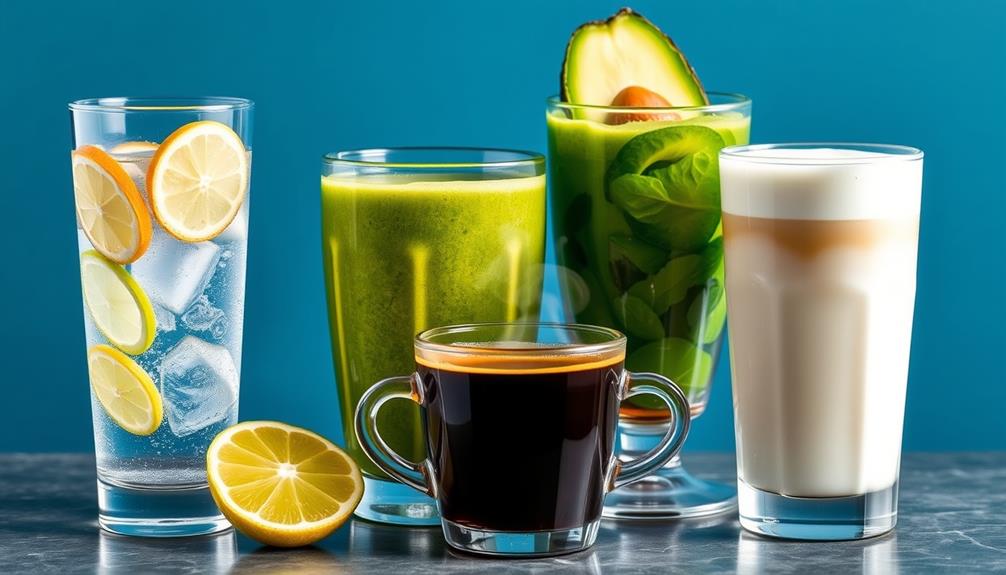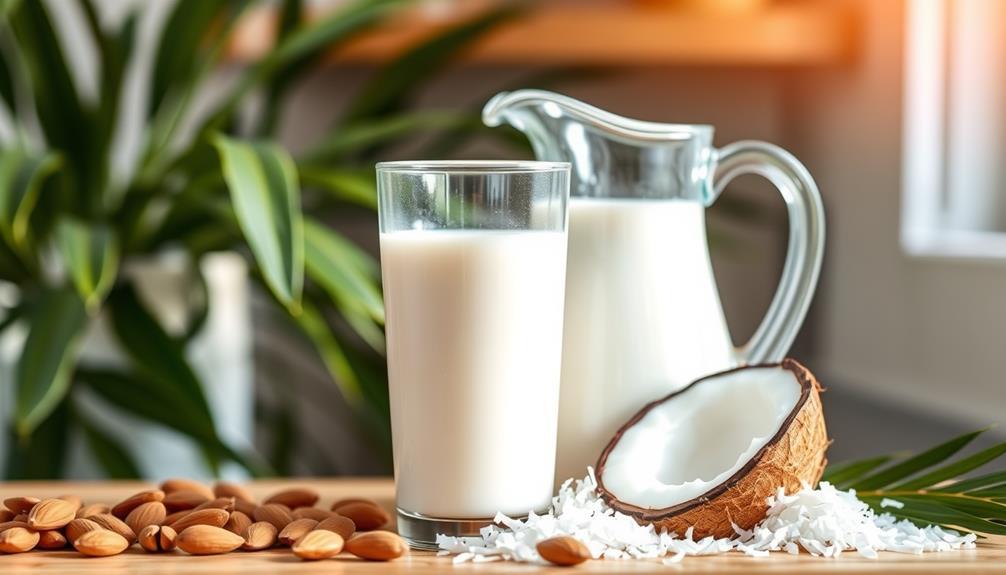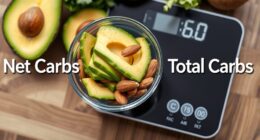On a keto diet, you'll want to avoid high-carb foods to maintain ketosis. This means steering clear of grains like wheat, rice, and oats, as well as sugary snacks and desserts. High-carb fruits, such as bananas and grapes, should also be limited, along with starchy vegetables like potatoes and corn. Legumes like beans and lentils are off-limits too. Processed foods, sugary condiments, and certain alcoholic beverages can disrupt your progress as well. Choosing low-carb alternatives is key to success. If you're curious about what to enjoy instead, there's more to explore.
Key Takeaways
- Avoid high-carb grains like wheat, rice, and oats, which can disrupt ketosis.
- Steer clear of sugary foods and sweets that contain hidden sugars and excessive carbs.
- Limit high-carb fruits such as bananas and grapes that can derail keto efforts.
- Eliminate starchy vegetables like potatoes and corn, which are high in net carbs.
- Refrain from processed foods that often contain refined carbs and unhealthy fats.
Carbohydrate-Rich Grains

Carbohydrate-rich grains can be a significant roadblock on your keto journey. Foods like wheat, rice, oats, and barley are high in carbohydrates, making it tough to maintain your daily carb allowance of 20-50 grams necessary for ketosis.
For instance, a slice of white bread packs around 13 grams of carbs, while a cup of cooked white pasta contains about 33 grams. Even quinoa, often touted as a health food, has approximately 39 grams of carbs per cooked cup, rendering it unsuitable for your keto diet.
Additionally, consuming high-carb foods can lead to gastrointestinal discomfort, similar to issues seen with Cranberry Juice Consumption, particularly if you're used to a low-carb lifestyle. Gluten-free grains, like corn, aren't safe bets either, as they can still push you over that daily carb limit.
You should also steer clear of refined grains found in pastries and cereals, which can spike blood sugar levels and disrupt your keto metabolic state. Instead, focus on low-carb options like cauliflower rice or zucchini noodles.
These alternatives not only help you avoid high carb pitfalls but also provide similar textures that make meals enjoyable. By keeping an eye on your grain intake, you can stay on track and enjoy the benefits of ketosis.
Sugary Foods and Sweets

Sugary foods and sweets are major pitfalls on the keto diet, and you'll want to steer clear of them to maintain ketosis. These foods often contain high amounts of carbohydrates that can disrupt your progress. For instance, common items like honey and maple syrup pack substantial carbs, greatly exceeding your daily carb limits.
Here's a quick reference table for common sugary foods:
| Item | Carbohydrates (per serving) |
|---|---|
| Honey | 17g |
| Maple Syrup | 13g |
| Sweetened Beverages | Up to 39g |
| Granola Bars | >20g |
Additionally, don't forget about hidden sugars in everyday condiments like ketchup and barbecue sauce, which can spike your blood sugar levels. Even beverages like soda and fruit juices are detrimental, often loaded with sugar. These sugary foods and sweets can easily derail your ketogenic diet, so it's essential to read labels carefully and avoid items that don't align with your low-carb lifestyle. Stick to whole foods to stay on track!
High-Carb Fruits

When you're following a keto diet, it's vital to watch out for high-carb fruits that can throw off your carb count.
Fruits like bananas, grapes, and mangoes pack a significant amount of net carbs, making them unsuitable for your daily intake.
Additionally, it's important to keep in mind that some essential oils, such as eucalyptus oil, can support respiratory health and overall well-being, complementing your dietary choices.
Instead, consider low-carb alternatives that keep you within your limits while still satisfying your cravings.
Fruits to Avoid
Sticking to a ketogenic diet means being mindful of the fruits you choose, as some can throw your carb count off balance. High-carb fruits are your biggest concern. For instance, a medium banana packs around 24 grams of net carbs, making it a poor choice for your meal plan.
Grapes aren't much better; with about 18 grams of net carbs per cup, they can quickly push you over your daily carb limits. Additionally, it's important to take into account the impact of your overall diet on health, including the potential role of natural remedies alongside conventional medications that can aid in your weight management journey.
Mangoes also fall into this category, containing approximately 22 grams of net carbs per medium fruit. These can disrupt your efforts in maintaining ketosis.
Dried fruits like dates are particularly troublesome, as just one Medjool date has around 18 grams of net carbs. Even apples, often viewed as healthy, should be limited on a keto diet, since a medium apple can hold about 21 grams of net carbs.
To stay on track with your keto diet, it's best to avoid these fruits. Keeping an eye on high-carb fruits helps guarantee you stay within your carb limits and maintain ketosis effectively.
Carb Counts Explained
Understanding carb counts is vital for anyone on a keto diet, especially since many fruits can easily derail your progress. High-carb fruits can greatly impact your daily carb limits, making it important to know which ones to avoid. For instance, a medium banana contains around 24 grams of net carbs, which is nearly a whole day's worth for many people on a ketogenic diet.
Additionally, exploring the coffee varieties that can complement your low-carb lifestyle may enhance your overall experience.
Grapes are another fruit you should limit, offering about 17 grams of net carbs per cup. This can quickly add up and hinder your ability to maintain ketosis. Similarly, a medium-sized apple packs about 19 grams of net carbs, making it unsuitable for your low-carb meal plan.
Mangoes are particularly troublesome, with one medium mango containing around 22 grams of net carbs.
Finally, don't forget about dried fruits. Just one Medjool date has approximately 18 grams of net carbs, making it a poor choice for your diet.
Low-Carb Alternatives
Finding suitable snacks can be challenging on a keto diet, especially with the allure of high-carb fruits. Foods like bananas, grapes, and mangoes are delicious but contain too many net carbs to fit your daily carb limits.
For instance, a medium banana has about 24 grams of net carbs, while a cup of grapes contains around 17 grams. Even apples can be problematic, packing around 19 grams of net carbs per medium fruit. Understanding the impact of different brewing methods on your caffeine intake can also help you choose beverages that align with your dietary goals.
To maintain ketosis, you'll want to steer clear of these high-carb fruits and focus on low-carb alternatives. Berries are a fantastic option—just half a cup of strawberries has roughly 6 grams of net carbs, making them a smart choice for a sweet snack.
You can also incorporate nonstarchy vegetables and healthy fats into your diet to keep you satisfied and energized.
When looking for snacks, remember that it's essential to choose wisely and avoid high-carb fruits. By opting for berries and other low-carb foods, you can enjoy delicious treats without jeopardizing your keto journey.
Stay mindful, and you'll find plenty of satisfying options that help you thrive on the keto diet.
Starchy Vegetables

When it comes to the keto diet, discipline is key, especially regarding starchy vegetables. These veggies, like potatoes, sweet potatoes, corn, and peas, are high in carbohydrates, which can derail your progress.
Since your daily carb intake should be limited to 20-50 grams, consuming just one medium potato can exceed that limit, packing over 30 grams of net carbs. Sweet potatoes aren't much better; a medium-sized serving has around 20 grams of net carbs, making them unsuitable for maintaining ketosis.
Additionally, understanding the importance of balanced diet choices can help you make informed decisions on what to eat. Corn is another starchy vegetable to watch out for, as it contains about 24 grams of net carbs per cup. Including these high-carb options can greatly impact your daily carb count and hinder your ability to stay in ketosis.
Instead, opt for non-starchy vegetables like leafy greens, broccoli, and cauliflower. These low-carb choices provide essential nutrients while keeping your carb intake in check.
Legumes and Beans

Legumes and beans may seem like a healthy choice, but they can quickly sabotage your keto diet. These foods are high in carbohydrates, which makes them incompatible with your goal to maintain ketosis.
It's important to understand how managing your diet plays a vital role in your overall financial health, similar to how budgeting helps you keep track of your expenses and income.
Here's why you should steer clear:
- Lentils: A typical serving contains about 20 grams of net carbs. That's already pushing your daily carb limit for keto!
- Chickpeas: With approximately 27 grams of net carbs per cup, they can greatly hinder your progress.
- Black Beans: Even in a half-cup serving, you're looking at around 15 grams of net carbs, which adds up fast.
The high fiber content in these legumes doesn't make up for their carbohydrate load.
On a ketogenic diet, keeping your net carbs low—ideally under 20-50 grams daily—is vital. Consuming just a single serving of lentils or chickpeas could derail your entire day, making it harder to achieve and maintain ketosis.
Processed Foods

Processed foods are among the biggest pitfalls for anyone trying to maintain a ketogenic diet. These items, often marketed as convenient, can derail your progress due to their high carb content and unhealthy ingredients. You might think you're making a healthy choice with packaged snacks labeled "low-fat," but they often contain hidden sugars that sabotage your efforts.
Here's a quick overview of some common processed foods to avoid:
| Type of Processed Food | Reasons to Avoid |
|---|---|
| Fast Foods | High in refined carbohydrates and unhealthy fats |
| Packaged Snacks | Often loaded with hidden sugars and unhealthy fats |
| Pre-Packaged Meals | Can have high carb content from fillers and sauces |
| Common Processed Meats | High in sodium and unhealthy fats, contributing to water retention |
Alcoholic Beverages

Steering through the world of alcoholic beverages can be tricky on a ketogenic diet. While it might be tempting to indulge, you need to be cautious about the impact of alcohol on your carb limits and overall ketosis.
Additionally, the high sugar content in many alcoholic drinks can lead to unwanted weight gain, much like the high sugar and fat content found in ice cream. Here are three key points to keep in mind:
- Light Beer: With around 6 grams of carbs per 12 oz can, light beer can quickly eat into your daily carb allowance.
- Mixed Drinks: These often come loaded with sugary mixers, sending carb counts skyrocketing and potentially derailing your keto progress.
- Dessert Wines: High in sugar, these wines can spike your blood sugar levels and disrupt ketosis.
Hard liquors like vodka, gin, and whiskey are lower in carbs but aren't without risks. Excessive consumption can lead to dehydration and hinder your weight loss efforts.
It's vital to monitor alcohol consumption carefully; otherwise, you might face nutrient imbalances or find yourself out of ketosis.
High-Carb Condiments

When following a ketogenic diet, it's not just alcoholic beverages that can sabotage your carb intake; high-carb condiments can also wreak havoc on your ketosis. Many popular condiments contain hidden sugars and can greatly raise your carb counts, which is similar to the regulatory compliance required for a successful IRA rollover process.
For instance, a packet of ketchup has about 3 grams of carbs, making it a poor choice for keto enthusiasts. Barbecue sauce isn't any better, averaging around 4 grams per packet. These numbers can add up quickly and disrupt your state of ketosis.
Sweet salad dressings, particularly certain vinaigrettes, often contain added sugars, with carb counts exceeding 5 grams per serving. Store-bought sauces and marinades may include high-fructose corn syrup or other sweeteners, further increasing their carb content.
To stay on track, you should steer clear of these high-carb condiments and consider low-carb alternatives instead.
Making homemade condiments allows you to control the ingredients and keep carbs in check. Use keto-friendly ingredients to whip up sauces that fit your diet. By being mindful of what you're adding to your meals, you can maintain your carb limits and enjoy your keto journey.
Frequently Asked Questions
What Foods Are Not Allowed on Keto?
On a keto diet, you shouldn't eat foods high in refined carbs, like white bread and pasta. Starchy veggies, sugary fruits, processed snacks, and sweetened dairy can disrupt your progress, so it's best to avoid them. Additionally, many beverages, especially those with added sugars, can also hinder ketosis. When it comes to milk on a keto diet, it’s important to be cautious, as regular milk contains carbohydrates that can add up quickly. Instead, unsweetened almond milk or coconut milk are popular low-carb alternatives.
Can I Eat a Banana on Keto?
You might crave that sweet banana, but eating it can sabotage your keto goals. Instead, opt for berries; they'll satisfy your fruit cravings without pushing your carb limit. Enjoy the taste without the guilt!
What Foods Don't Break Ketosis?
You'll want to focus on non-starchy vegetables, healthy fats, fatty proteins, low-carb dairy, and nuts. Foods like spinach, avocados, salmon, and cheese keep you in ketosis while providing essential nutrients and energy. Enjoy!
What Are 5 Foods to Avoid on a Low Carb Diet?
When following a low carb diet, avoid grains like rice and wheat, starchy vegetables like potatoes, high-carb fruits such as bananas, sugary beverages, and processed snacks. These can sabotage your progress and increase carb intake.
Conclusion
While you might crave the comfort of pasta or the sweetness of cake, embracing the keto diet means choosing a different path. It's not just about what you can't eat; it's about discovering the richness of low-carb foods that nourish your body. Trade those starchy vegetables for leafy greens, and let go of sugary treats to find satisfaction in healthy fats. In this contrast lies the true essence of keto—freedom from cravings and a journey toward better health.









